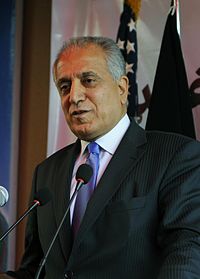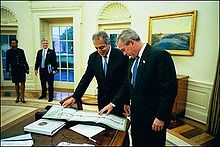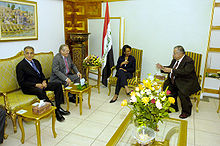- Zalmay Khalilzad
-
Zalmay Khalilzad 
Khalilzad speaking at a high school in Kabul, Afghanistan 26th United States Ambassador to the United Nations In office
17 April 2007 – 20 January 2009President George W. Bush Preceded by Alejandro Daniel Wolff Succeeded by Susan Rice United States Ambassador to Iraq In office
2005 – April 17, 2007President George W. Bush Preceded by John Negroponte Succeeded by Ryan Crocker United States Ambassador to Afghanistan In office
2003–2005President George W. Bush Preceded by Robert Finn Succeeded by Ronald E. Neumann Personal details Born March 22, 1951
Mazari Sharif, AfghanistanPolitical party Republican Spouse(s) Cheryl Benard Children Alexander Benard
Maximilian BenardAlma mater American University of Beirut
University of ChicagoProfession Academic and Diplomat Religion Islam[1] Zalmay Mamozy Khalilzad (Pashto: زلمی خلیلزاد - Zalmay Khalīlzād) (born: 22 March 1951) is a counselor at the Center for Strategic and International Studies (CSIS) and president of Khalilzad Associates, an international business consulting firm based in Washington, DC. He was the United States Ambassador to the United Nations under President George W. Bush. He has been involved with U.S. policy makers at the White House, State Department and Pentagon since the mid-1980s, and was the highest-ranking Muslim American in the Administration of U.S. President George W. Bush.[2] Khalilzad's previous assignments in the Administration include U.S. Ambassador to Afghanistan, U.S. Ambassador to Iraq and United States Permanent Representative to the United Nations.
Contents
Early history and personal life
Born in the city of Mazar-i-Sharif in northern Afghanistan to a Sunni Pashtun father and his wife, Zahra. Khalilzad's parents originated from Laghman Province of Afghanistan, and the family moved to Mazar-i-Sharif when his father was a government official under the monarchy of Mohammed Zahir Shah. Khalilzad describes himself as an ethnic Pashtun[3][4][5], and is fluent in English, Pashto, Dari (Persian) and Arabic languages. Khalilzad began his education at the public Ghazi Lycée school in Kabul. He first spent time in the United States as a Ceres, California high school exchange student with AFS Intercultural Programs. Later, he attained his bachelor's and master's degrees from the American University of Beirut in Lebanon. Khalilzad received his Ph.D at the University of Chicago in The United States, where he studied closely with strategic thinker Albert Wohlstetter, a prominent nuclear deterrence thinker and strategist, who provided Zalmay with contacts in the government and with RAND.[2]
Khalilzad is married to author and political analyst Cheryl Benard, whom he met in 1972 when they were both students at the American University of Beirut. They have two children, Alexander and Maximilian.
Career history
Presently, Khalilzad serves as the President of Khalilzad Associates, LLC an "international advisory firm that serves clients at the nexus of commerce and public policies, helping global businesses navigate the most promising and challenging international markets." [6] Khalilzad Associates and its parent company Gryphon Capital Partners counts among its clients international and US companies, which are primarily interested in doing business in Iraq and Afghanistan. According to Khalilzad, these include companies in the sectors of energy, construction, education, and infrastructure.[7]
Khalilzad also currently serves as a Counselor at the Center for Strategic International Studies (CSIS) and sits on the Boards of the National Endowment for Democracy (NED), America Abroad Media (AAM), the RAND Corporation's Middle East Studies Center, the American University of Iraq in Suleymania (AUIS), and the American University of Afghanistan (AUAF).[8]
From 1979 to 1989, Khalilzad worked as an Assistant Professor of Political Science at Columbia University's School of International and Public Affairs. During that time, he worked closely with Zbigniew Brzezinski, the Carter Administration's architect of the policy supporting the mujahideen resistance to the Soviet Union's invasion of Afghanistan.[2] (See also: Operation Cyclone.)
In 1984, Khalilzad accepted a one-year Council on Foreign Relations fellowship to join the State Department, where he was an advisor to the Near East and South Asia Bureau headed by Richard Murphy. From 1985 to 1989, Khalilzad served in President Ronald Reagan's Administration as a senior State Department official advising on the Soviet war in Afghanistan and the Iran–Iraq War. During this time, he was a member of the policy planning staff and the State Department's Special Advisor on Afghanistan to Undersecretary of State Michael H. Armacost. In this role, he developed and guided the international program to promote the merits of a Mujahideen-led Afghanistan to oust the Soviet occupation. From 1990-1992, Khalilzad served under President George H. W. Bush in the Defense Department as Deputy Undersecretary for Policy Planning.
Between 1993 and 2000, Khalilzad was the Director of the Strategy, Doctrine, and Force Structure at the RAND Corporation. During this time, he helped found RAND's Center for Middle Eastern Studies as well as "Strategic Appraisal," a periodic RAND publication. He also authored several influential monographs, including "The United States and a Rising China" and "From Containment to Global Leadership? America and the World After the Cold War." While at RAND, Khalilzad also had a brief stint consulting for Cambridge Energy Research Associates, which at the time was conducting a risk analysis for Unocal, now part of Chevron, for a proposed 1,400 km (890 mile), $2-billion, 622 m³/s (22,000 ft³/s) Trans-Afghanistan gas pipeline project which would have extended from Turkmenistan to Afghanistan and further proceeding to Pakistan. As one of the original members of Project for the New American Century, Khalilzad was a signatory of the letter to President Bill Clinton sent on January 26, 1998, which called for him to accept the aim of "removing Saddam Hussein and his regime from power" using "a full complement of diplomatic, political and military efforts."[9]
United States Ambassador to Afghanistan
 Khalilzad presenting President George W. Bush a ballot from the first democratic election in Afghanistan on 18 October 2004.
Khalilzad presenting President George W. Bush a ballot from the first democratic election in Afghanistan on 18 October 2004.
In 2001, President George W. Bush asked Khalilzad to head the Bush-Cheney transition team for the Department of Defense and Khalilzad briefly served as Counselor to Secretary of Defense Donald Rumsfeld. In May 2001, National Security Advisor Condoleezza Rice announced Khalilzad's appointment as Special Assistant to the President and Senior Director for Southwest Asia, Near East, and North African Affairs at the National Security Council. In December 2002 the President appointed Khalilzad to the position of Ambassador at Large for Free Iraqis with the task of coordinating "preparations for a post-Saddam Hussein Iraq."[10]
After the terrorist attacks of 9/11, President Bush came to rely on Khalilzad's Afghanistan expertise. Khalilzad was involved in the early stages of planning to overthrow the Taliban and on December 31, 2001 was selected as Bush's Special Presidential Envoy for Afghanistan. He served in that position until November 2003, when he was appointed to serve as U.S. Ambassador to Afghanistan.
Khalilzad held the position of U.S. Ambassador to Afghanistan from November 2003 until June 2005. During this time, he oversaw the drafting of Afghanistan's constitution, was involved with the country's first elections, and helped to organize the first meeting of Afghanistan's parliament (the Loya Jirga). At the June, 2002, Loya Jirga to select the Head of State, representatives of the US convinced the former king of Afghanistan, 87-year old Zahir Shah, to withdraw from consideration, even though a majority of Loya Jirga delegates supported him, a move which angered Pashtuns who were concerned with the disproportionate power of the Northern Alliance in the Karzai government.[11] During Khalilzad's tenure as ambassador, Afghan President Hamid Karzai consulted closely with him on a regular basis about political decisions and the two dined together regularly.[12][13] During 2004 and 2005 he was also involved in helping with the establishment of the American University of Afghanistan (AUAF), which is the first American-style higher learning educational institution in Afghanistan.[14]
U.S. Ambassador to Iraq
Khalilzad began his job as U.S. Ambassador to Iraq on June 21, 2005. He was credited for helping negotiate compromises which allowed the ratification of Iraq's Constitution in October 2005. Khalilzad also worked to ensure that the December 2005 elections ran smoothly and played a substantial role in forming the first post-Saddam government. Khalilzad also helped establish the American University of Iraq in Sulaimaniya and sits on its board of regents.[15]
In comparison to his predecessors Paul Bremer and John Negroponte in Baghdad, Khalilzad was considered a success as US Ambassador and credited with bringing a cultural sophistication and human touch to the job that helped connect with Iraqis.[16] Khalilzad was one of the first high-level Administration officials to warn that sectarian violence was overtaking the insurgency as the number one threat to Iraq's stability. After the Al Askari shrine bombing, in February 2006, he warned that spreading sectarian violence might lead to civil war — and possibly even a broader conflict involving neighboring countries. Khalilzad sought political solutions to the problem of sectarianism, in particular working to integrate the balance of power between Iraq's three main ethic groups in order to head off growing Sunni violence.[16]
Khalilzad's term as Ambassador to Iraq ended on March 26, 2007. He was replaced by Ryan Crocker, a career diplomat who was serving as Ambassador to Pakistan previously.
U.S. Ambassador to the United Nations
On 12 February 2007, the White House submitted Khalilzad's nomination to the Senate to become U.S. Ambassador to the United Nations.[17] He was confirmed by the Democratic-controlled U.S. Senate on March 29, 2007 by a unanimous voice vote.[18] This marked a strong contrast to Khalilzad's predecessor, John R. Bolton, whose often controversial rhetoric caused him to fail to be confirmed by the United States Senate resulting in a recess appointment. Colleagues at the UN noted that Khalilzad has a different, more reconciling style than Bolton's.[19]
In November 2007, Khalilzad charged that Iran is helping the insurgent groups in Afghanistan and Iraq. He also told the media, soon after the International Atomic Energy Agency (IAEA) released its report on Iran, that the Iranian government is clearly going ahead with its nuclear program. Khalilzad explained that the United States will try to pass another resolution in the U.N. Security Council under Chapter 7, to impose additional sanctions on Iran.[20]
Khalilzad, along with most U.S. politicians, supported Kosovo's independence.
In August 2008, he urged the UN Security Council to "take urgent action" and "condemn Russia's military assault on the sovereign state of Georgia,"[21] in addition to stating that Russian Foreign Minister Sergey Lavrov had told Secretary of State Rice that Georgian president Mikheil Saakashvili "must go."[22]
Writing on U.S. leadership
Khalilzad wrote several articles on the subject of the value of U.S. global leadership in the mid-1990s. The specific scenarios for conflict he envisioned in the case of a decline in American power have made his writings extremely popular in the world of competitive high school and college policy debate, particularly his writing linking the loss of United States hegemony to global instability.
- Khalilzad, Zalmay (1995). "Losing the moment? The United States and the world after the Cold War". The Washington Quarterly 18:2: 03012.
References
- ^ Zalmay Khalilzad: US power broker BBC. 2007-01-08. Retrieved on 2009-11-01.
- ^ a b c International House at the University of Chicago - Alumni In The News, Ambassador Zalmay M. Khalilzad, PhD '79
- ^ USA Today - Bush names special envoy to Afghanistan, December 31, 2001
- ^ ABC News - Who Is Zalmay Khalilzad?, by Andrew Chang, September 30, 2004
- ^ The Guardian
- ^ http://khalilzadassociates.com/aboutus.aspx
- ^ http://www.investorsiraq.com/showthread.php?145265-From-diplomat-to-oilman-Khalilzad-returns-to-Iraq
- ^ http://www.khalilzadassociates.com/ourteam.aspx
- ^ Letter Dated: January 26, 1998
- ^ The White House - Statement by the Press Secretary (December 2, 2002)
- ^ New York Times - Afghan Democracy and Its First Missteps By S. Frederick Starr and Marin J. Strmecki, Friday, June 14, 2002
- ^ Parker, Kathleen (April 11, 2010). "The U.S. can't ignore Karzai's tantrum". The Washington Post. http://www.washingtonpost.com/wp-dyn/content/article/2010/04/09/AR2010040904013.html.
- ^ TIME - Inside Karzai's Campaign (October 4, 2004)
- ^ Azizi Hotak General Trading Group
- ^ Dagher, Sam (July 14, 2010). "Prospects Abound Among the Kurds". The New York Times. http://www.nytimes.com/2010/07/15/world/middleeast/15erbil.html.
- ^ a b Steele, Jonathan (April 23, 2006). "The viceroy of Baghdad". The Guardian (London). http://www.guardian.co.uk/world/2006/apr/23/iraq.jonathansteele.
- ^ The White House - Nominations and Withdrawal Sent to the Senate (February 12, 2007)
- ^ Examiner - New U.S. Ambassador to U.N. Starts Job (April 23, 2007)
- ^ "A matter of honour". The Economist. 2007-07-26. http://www.economist.com/world/international/displaystory.cfm?story_id=9546302. Retrieved 2007-08-16.
- ^ Pajhwok Afghan News, Iran supports insurgent groups in Afghanistan: Khalilzad (Nov. 16, 2007)
- ^ http://www.bloomberg.com/apps/news?pid=20601087&sid=aEb2_xjZ46kQ&refer=home
- ^ http://www.usunnewyork.usmission.gov/press_releases/20080810_219.html
External links
- Appearances on C-SPAN
- Zalmay Khalilzad on Charlie Rose
- Zalmay Khalilzad at the Internet Movie Database
- Works by or about Zalmay Khalilzad in libraries (WorldCat catalog)
- Zalmay Khalilzad collected news and commentary at The New York Times
- Zalmay Khalilzad at the Notable Names Database
- Articles
- The Washington Post - Afghan Roots Keep Adviser Firmly in the Inner Circle
- US Mission to the UN - United States Ambassadors to the United Nations
- Current Biography August 2006 cover story
- The New Yorker - American Viceroy
- RFE/RL interview with Zalmay Khalilzad (May 18, 2007)
- Zalmay.com, a profile view
- Profile: Khalilzad, The Center for Cooperative Research
- Video: Khalilzad discusses Iraq, Afghanistan and the Middle East
Diplomatic posts Preceded by
Robert FinnUnited States Ambassador to Afghanistan
2003 – 2005Succeeded by
Ronald E. NeumannPreceded by
John NegroponteUnited States Ambassador to Iraq
June 21, 2005 – March 26, 2007Succeeded by
Ryan CrockerPreceded by
Alejandro Daniel WolffUnited States Ambassador to the United Nations
April 17, 2007 – January 20, 2009Succeeded by
Susan RiceUnited States Ambassadors to the United Nations Edward Stettinius, Jr. · Warren Austin · Henry Cabot Lodge, Jr. · James J. Wadsworth · Adlai Stevenson · Arthur Goldberg · George Ball · James R. Wiggins · Charles W. Yost · George H. W. Bush · John A. Scali · Daniel P. Moynihan · William Scranton · Andrew Young · Donald McHenry · Jeane Kirkpatrick · Vernon A. Walters · Thomas R. Pickering · Edward J. Perkins · Madeleine Albright · Bill Richardson · Richard Holbrooke · John Negroponte · John Danforth · John R. Bolton · Zalmay Khalilzad · Susan RiceCategories:- 1951 births
- Living people
- People from Mazar-i-Sharif
- American people of Afghan descent
- American University of Beirut alumni
- Columbia University faculty
- Afghan emigrants to the United States
- Naturalized citizens of the United States
- Pashtun people
- RAND Corporation people
- Afghan Muslims
- American Muslims
- United States ambassadors to Afghanistan
- United States ambassadors to Iraq
- Permanent Representatives of the United States to the United Nations
- University of Chicago alumni
- Presidents of the United Nations Security Council
- Reagan Administration personnel
- George W. Bush Administration personnel
- United States National Security Council staffers
Wikimedia Foundation. 2010.


